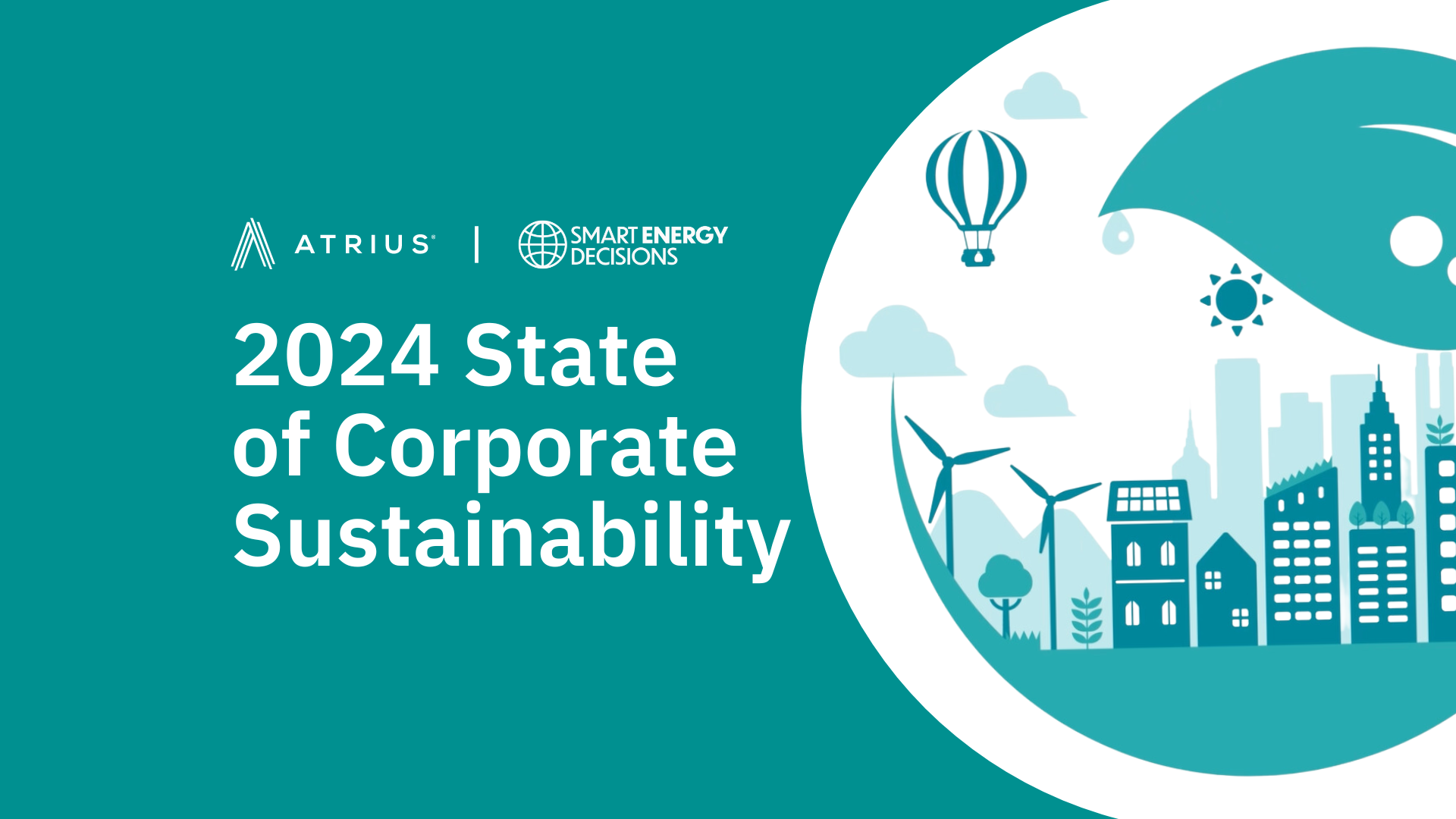Atrius® is built on the belief that technology can solve some of society’s most urgent challenges around sustainability when it is in the hands of those who are passionate, knowledgeable and empowered. Every year we are seeing more companies formally communicate their net-zero and sustainability missions. We are learning that while technology is essential, the human element is the determining factor for progress towards these goals. Technology serves as the bridge that can help sustainability teams innovate, collaborate, and build compelling cases for resources.
Atrius’ second annual State of Corporate Sustainability report, a survey conducted with Smart Energy Decisions (SED), illuminates the trends and challenges associated with companies on their sustainability journeys. Collectively, we are moving towards smarter, safer, greener spaces. The rate and scale of progress varies widely across industries and companies, but it is clear that companies are realizing that sustainability is a complex process that can no longer be siloed within an organization. Accelerating this movement hinges on having skilled professionals who have access to the technology that will help them do their jobs.
Last year’s report brought to light that the megatrends of technology and sustainability were beginning to intersect. The 2024 State of Corporate Sustainability report tells a more nuanced story of how we are now at the confluence of these megatrends. It’s encouraging to note that sustainability is now more often identified as a core strategy that succeeds when interwoven across a company’s operations. A greater percentage of organizations (60%) are taking that critical first step of measuring and reporting on their sustainability goals.
We also found that an increase in ESG goals correlated to factors such as executive compensation and vendor selection. To meet net zero targets, 30% are at the beginning stages, i.e., inputting manual data into a spreadsheet), while 27% are taking their first steps toward centralized systems with automated utility and emissions data collection.
And, it’s timely they’re starting because companies are going to need to prepare for a more stringent regulatory climate. The U.S. Securities and Exchange Commission will make its disclosure ruling this spring, a proposal that could require public companies to file standardized disclosure reports related to their emissions and net-zero transition plans. This proposal wouldn’t take effect until 2026. But our data found that 65 percent of surveyed companies report behind, or just getting started, on Scope 3 (indirect greenhouse gas) tracking. Integrating technology now will help them pressure test their monitoring and reporting processes before they’re formally required.
Other trends uncovered in this year’s survey results was an overall increase in the number of organizations using a reporting framework to share progress across their companies. A tenet of successful sustainability strategy is the ability to communicate progress both internally and externally. In addition, automating emissions reporting increased by 19% from the previous year as more organizations turn to technology to enhance the accuracy and efficiency of these processes.
But, we are still at the earliest stages. It’s striking to see how varied the responses were compared to 2022 regarding overall progress. We see this as reflecting how much more complex the space is getting. The sheer volume of data involved requires software tools that can support teams in their information compilation and analysis. However, they continue to face the perennial challenges of budgetary restraints and unclear mandates. Compared to last year’s results, we noted a sharp decrease (100%) in the number of respondents who said they’re ahead of pace on goals, as well as an increase (66%) in the number of those who are behind on meeting goals. We also saw an 11% drop in compiling real-time utility reports (31%) compared to last year (42%).
Teams are still burdened by having to spend way too much time just collecting and managing data, and they lack access to automation tools that would free them to do more high-level tasks. Even though sustainability continues to rise in importance at every level of organizations, investments still lag. Eighty percent of respondents reported that resources and funding were the most important elements to the success of their program.

We continue to experience the power that technology has in our world. New artificial intelligence tools are revisioning how people work in almost every industry. Those who are responsible for energy use can use tools and software to help them make the necessary action within the built space itself. Empowered teams who are equipped with purpose-built technology are exponentially hastening our collective sustainability progress. To aid these sustainability experts in the integral aspect of compiling and managing vast amounts of data collection, they must be supported for both short-term goals and long-term success.
Atrius and Smart Energy Decisions will delve deeper into the 2024 State of Corporate Sustainability’s findings at a Wednesday, Jan. 31 webinar hosted by Lauren Scott, Vice President, Marketing and Sustainability, Intelligent Spaces Group, Acuity Brands.
Join us by registering now.
